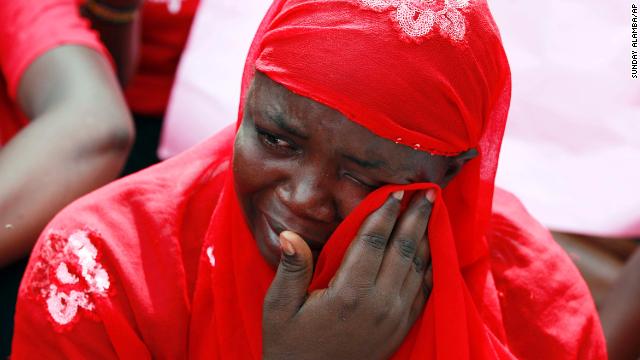May 07, 2014
What’s at stake in war against girls’ kidnappers? CNN.com
What's at stake in war against girls' kidnappers?
By Peter Bergen and Bailey Cahall
updated 2:38 PM EDT, Tue May 6, 2014
 A woman attends a demonstration Tuesday, May 6, that called for the Nigerian government to rescue more than 200 schoolgirls who were kidnapped last month in Chibok, Nigeria. The girls were taken by the Islamist militant group Boko Haram, which means "Western education is sin."
A woman attends a demonstration Tuesday, May 6, that called for the Nigerian government to rescue more than 200 schoolgirls who were kidnapped last month in Chibok, Nigeria. The girls were taken by the Islamist militant group Boko Haram, which means "Western education is sin."
STORY HIGHLIGHTS
- Boko Haram leader says it has kidnapped more than 200 girls in Nigeria
- Peter Bergen: Nigeria is just about to host a world economic conference
- He says the terror group's actions jeopardize Africa's largest economy
- Bergen: Boko Haram hasn't formalized ties to al Qaeda, but it could threaten Westerners

Peter Bergen
The Boko Haram leader explained that the girls should not be attending school and should instead get married. He also threatened to sell the girls in the marketplace because, he said while laughing, "Allah says I should sell. He commands me to sell. I will sell women." That statement, coming the day after Nigerian President Goodluck Jonathan held a nationally televised "media chat" in which he vowed to rescue the girls, highlights Boko Haram's growing power in the country, as well as the government's relative inability to stop the group's attacks. If Boko Haram's growing insurgency isn't halted in Nigeria, it threatens to jeopardize the largest economy in Africa and the some $100 billion in oil revenue the country generates every year. Boko Haram, whose name means "Western education is forbidden," has been at war with the Nigerian state for years. Founded in 2002 by Mohammed Yusuf, a member of the short-lived "Nigerian Taliban," it is predominantly focused on attacking the Nigerian government and implementing Taliban-style Sharia law. Yusuf was killed in 2009 while he was in police custody. There is no doubt that Boko Haram is a growing threat to Nigerians, but to what extent is it also a threat to Western interests? So far not much, although that could change. In the 12 years since its creation, Boko Haram has attacked an international target only once, when it bombed the United Nations office in the Nigerian capital Abuja in August 2011. A year earlier, Shekau, the Boko Haram leader, had released a statement expressing solidarity with al Qaeda and threatening the United States, and Osama bin Laden was reportedly in direct contact with the group's leaders. However, al Qaeda has never formalized any kind of partnership with Boko Haram. That said, the group has received some funding from the North African al Qaeda affiliate, al Qaeda in the Islamic Maghreb, or AQIM; the exact numbers are unknown, but it is estimated that AQIM has accumulated $90 million, much of it from kidnappings. 6 reasons why the world should demand action The United States is sufficiently worried about anti-Western terrorism in Nigeria that on Friday the State Department released a warning to Americans traveling in and to Nigeria that "groups associated with terrorism" may be planning an attack on a Sheraton hotel in Lagos, the country's commercial center.
Though Lagos has never been attacked by Boko Haram, recent bombings in Abuja -- the first in two years -- show that militants are increasingly turning to targets outside their home base in Nigeria's northern territories. To combat the growing threat of Boko Haram, the President placed the northern states of Adamawa, Borno and Yobe under a six-month state of emergency in May 2013; the state of emergency was extended for six more months in November. But despite the heightened presence of security forces in those states, the Boko Haram insurgency has worsened. Amnesty International reported on Saturday that more than 1,500 people were killed because of fighting between Islamist militant groups and the government in the first three months of 2014, a total greater than in all of 2013. Continuing this trend, 19 people were killed and more than 60 were injured in a car bombing in an Abuja suburb on Thursday. (No group has claimed responsibility for that bombing, but it occurred in the same area as a Boko Haram attack that killed at least 70 people on April 14.) Initially, Jonathan downplayed the Boko Haram threat, calling the situation "temporary" and arguing that the Nigerian security forces were winning the battle against the militants. But after international criticism and domestic outrage, Jonathan has called for an investigation into the mass kidnappings of the girls in April and has said he is open to receiving foreign assistance. Boko Haram: The essence of terror Some of this assistance will be coming from the United States, with a U.S. official telling CNN that: "You are going to see a focus on this in all three channels of government: diplomatic, intelligence and military." Adding to the growing frustration within Nigeria over the abductions are reports that Patience Jonathan, Nigeria's first lady, bizarrely ordered the arrest of two of the leaders of the protests that had erupted after the kidnappings of the girls in April, and had even denied the kidnappings had taken place. Patience Jonathan's office has denied the reports, but she was quoted by the News Agency of Nigeria as saying, "You are playing games. Don't use schoolchildren and women for demonstrations again."

FEATURED BOOK

